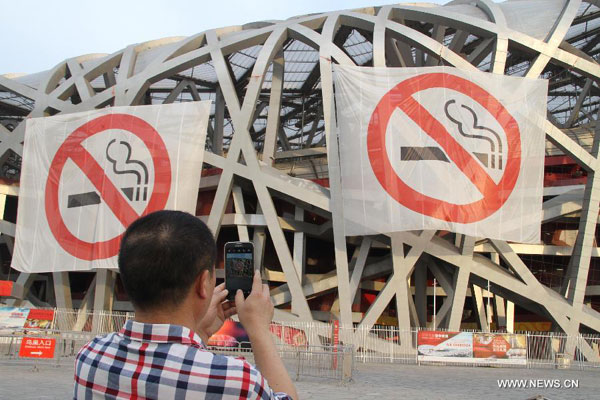

 |
| Non-smoking banners are displayed on the iconic Bird's Nest National Stadium in Beijing, capital of China on June 1, 2015. [Photo/Xinhua] |
June was a great month in Beijing. The weather was warm, the flowers in full bloom, and there were plenty of crystal clear days outside – with blue sky and lovely white clouds. I’ve loved being out and about, just soaking it all up. And all the more so since indoor public places across the city – including restaurants, cafes, bars, and hotels – are now smoke-free.
On June 1, Beijing’s new smoking control law came into effect. The Beijing law is the toughest tobacco control law in China to date. Smoking is prohibited in all indoor public places, and many outdoor public places such as kindergartens and schools. There are tough penalties for owners and managers of establishments who don’t comply.
The Beijing government’s work to enforce the law is off to a great start. The health inspectors have been out and about in force, supported by thousands of community volunteers. If you break the law, you will pay a fine – dozens of businesses have been issued fines in the last couple of weeks alone. Beijing’s residents are actively engaging in the enforcement effort too: several thousand complaints have been made to the 12320 hotline.
Alongside the official enforcement effort, I’ve been especially pleased to see various venues supporting implementation of the law: like the local bar near my house which used to allow smoking, where I saw the fuwuyuan firmly explaining to her patrons that smoking indoors is no longer allowed. Or the big, buzzing Chinese restaurant I took some visiting colleagues, where, when the staff discovered we were from the World Health Organization, told us how pleased they were not to have to breathe their customers’ second-hand smoke any more.
It’s also been great to see Beijing Capital International Airport join the leading modern airports in the world, like London Heathrow and Los Angeles International, by making indoor smoking rooms a thing of the past.
I think even those who doubted whether the law could or would be effectively enforced would have to admit to being pleasantly surprised.
Of course, there will continue to be naysayers – those who say that it will never work, or never last. This happens all over the world. But with a tough law, accompanied by continued strong enforcement, there is no reason to think that Beijing will be any different to other great cities in the world like New York, London, and Sydney – where “smoke-free” is now the unquestioned norm.
I’m confident of this, because we know that there is strong public support in Beijing for public places being smoke-free. And the international experience suggests that public support will increase over time, even among smokers themselves, as the public comes to realize the benefits of the law.
And with good reason: the benefits of smoke-free laws are substantial. Exposure to second-hand smoke is deadly. There is no safe level of exposure. Most people don’t realize that second-hand smoke causes dangerously high levels of indoor air pollution. The PM2.5 reading when just three people are smoking in a restaurant is likely to be around 600; five smokers, and the reading is likely to top 1,200 – far worse than the outdoor air pollution on even a heavily polluted day.
The war against outdoor air pollution is a complex, long-term task. Fixing indoor air pollution caused by second-hand smoke can happen overnight by making public places 100 percent smoke-free. Beijing has now taken its place alongside other great cities around the world in doing this – and the residents of Beijing are now breathing easier for that.
 4-year-old cute 'monk' spends summer holiday in temple
4-year-old cute 'monk' spends summer holiday in temple College graduates shining on the red carpet in Nanjing
College graduates shining on the red carpet in Nanjing PLA soldiers launch guided missiles in confrontation exercise
PLA soldiers launch guided missiles in confrontation exercise One woman’s fight against dog eaters
One woman’s fight against dog eaters Beautiful and smart - post-90s college teacher goes viral
Beautiful and smart - post-90s college teacher goes viral Top 10 luxury houses in the world
Top 10 luxury houses in the world  National Geographic: best photos during journey
National Geographic: best photos during journey Couples who engage in meaningful and deep conversations are happier
Couples who engage in meaningful and deep conversations are happier Maldives resort rated best hotel of 2015
Maldives resort rated best hotel of 2015  Through AIIB, China can learn to lead
Through AIIB, China can learn to lead Greece shuts banks as default looms, closer to euro exit
Greece shuts banks as default looms, closer to euro exit Xi'an 'Superman'shines a light on the city's errand runners
Xi'an 'Superman'shines a light on the city's errand runners Pole dancers challenge dog meat festival with provocative photo series
Pole dancers challenge dog meat festival with provocative photo seriesDay|Week